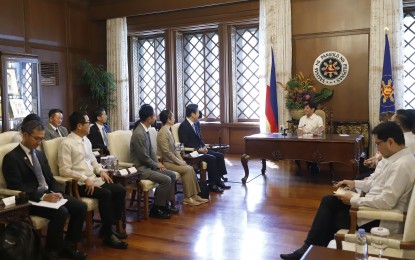
REGIONAL PEACE. President Ferdinand R. Marcos Jr. welcomes officials of Japan’s Komeito Party led by Chief Representative Natsuo Yamaguchi (front, left row) during their courtesy call at Malacañan Palace on Wednesday (August 16, 2023). During their meeting, Marcos emphasized the importance of pursuing security and defense initiatives to maintain peace in the Asia-Pacific. (PNA photo by Alfred Frias)
MANILA – President Ferdinand R. Marcos Jr. has emphasized the importance of pursuing security and defense initiatives to maintain peace in the Asia-Pacific.
In a meeting with Komeito Party Chief Representative Natsuo Yamaguchi at Malacañan Palace in Manila on Wednesday, Marcos said the Philippines and Japan can work together to ensure peace and stability in the region.
Marcos made the call, as he stressed the need to ease the tensions in the South China Sea (SCS) and the Korean Peninsula.
“We now have to concern ourselves with issues of security and defense in our region,” he told Yamaguchi.
“It is something that although we would say is not top of mind in terms of security and defense, we consider it a critical issue that we in the region must work together very, very hard to try to alleviate the tensions, to try to make all the proponents of peace in the region be the dominant voice,” Marcos said.
Marcos added that there is a “continuing great concern” over North Korea’s actuations, noting that Japan is “being very much in the line of fire.”
With regard to the SCS issue, Marcos recognized Japan’s important role in keeping peace in the busy waterway.
“We must acknowledge the very important contributions that Japan has made to the Philippines in terms of not only training, not only in terms of equipment but also the agreements that we have been able to forge between our two countries in terms of cooperation, in terms of preserving the peace and allowing the free conduct of trade and shipping in the South China Sea,” he said.
Marcos also expressed support for Japanese Prime Minister Fumio Kishida’s call for economic peace and economic strength, saying “the two are interconnected.”
“We certainly subscribe to that idea and once again, the partnerships and the agreements that Japan and the Philippines can come to on a bilateral basis, but also on a multilateral basis,” Marcos said. “I refer to the trilateral agreements that we have been talking about and have started to implement in terms of joint patrols, in terms of joint exercises for the two maritime forces of Japan and the Philippines.”
The Philippines and Japan maintain strong defense cooperation, with the two countries signing the Transfer of Defense Equipment and Technology Agreement in February 2016 that paved the way for acquisitions and procurements that have contributed to the Philippine defense posture.
In 2015, the two nations signed the Memorandum on Defense Cooperation and Exchanges between the DND and Japan’s Ministry of Defense.
In June this year, the Philippine Coast Guard (PCG), Japan Coast Guard (JCG), and United States Coast Guard (USCG) conducted an afloat Trilateral PCG-USCG-JCG Exercise near Bataan to enhance interoperability and share best practices in common coast guard missions.
The Non-Project Grant Aid amounting to USD7.78 million for the Satellite Data Communications System (SDCS) for the PCG was signed between the Philippines and pan this August to enhance PCG’s capacity to monitor the country's vast maritime jurisdiction, particularly in the West Philippine Sea. (PNA)
